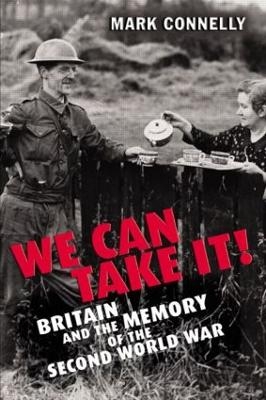
We Can Take It!
Seiten
2004
Longman (Verlag)
978-0-582-50607-7 (ISBN)
Longman (Verlag)
978-0-582-50607-7 (ISBN)
Explores how the memory of the Second World War continues to affect British contemporary life. This book explores the way in which the British memory of the Second World War was created during the war, and maintained after it through cultural artifacts such as films, comics, art, literature and toys.
`We Can Take It!' shows that the British remember the war in a peculiar way, thanks to a mix of particular images and evidence. Our memory has been shaped by material which is completely removed from historical reality. These images (including complete inventions) have combined to make a new history. The vision is mostly cosy and suits the way in which the Britons conceive of themselves: dogged, good humoured, occasionally bumbling, unified and enjoying diversity. In fact Britons load their memory towards the early part of the war (Dunkirk, Blitz, Battle of Britain) rather than when we were successful in the air or against Italy and Germany with invasions. This suits our love of being the underdog, fighting against the odds, and being in a crisis. Conversely, the periods of the war during which Britain was in the ascendant are, perversely, far more hazy in the public memory.
`We Can Take It!' shows that the British remember the war in a peculiar way, thanks to a mix of particular images and evidence. Our memory has been shaped by material which is completely removed from historical reality. These images (including complete inventions) have combined to make a new history. The vision is mostly cosy and suits the way in which the Britons conceive of themselves: dogged, good humoured, occasionally bumbling, unified and enjoying diversity. In fact Britons load their memory towards the early part of the war (Dunkirk, Blitz, Battle of Britain) rather than when we were successful in the air or against Italy and Germany with invasions. This suits our love of being the underdog, fighting against the odds, and being in a crisis. Conversely, the periods of the war during which Britain was in the ascendant are, perversely, far more hazy in the public memory.
Connelly, Mark
Introduction. 1. Mr Chamberlain’s face: September 1939-May 1940. 2. A Colossal Military Disaster: Dunkirk and the Fall of France, May- June 1940. 3. The Fewest of the Few: the Battle of Britain, June-September 1940. 4. London Pride has been handed down to us: the Blitz, September 1940-May 1941. 5. Over-sexed, over-paid and over here: Home Front, 1941-1945, Yanks, Women and Auntie Beeb. 6. Bless 'em all – the British Army, 1941-1945. 7. ‘Take That, Fritz’: commandos, prisoners of war and the boy’s own war. 8. ‘It ain’t half hot mum’: the forgotten campaigns. 9. Gotcha!: recasting the Second World War, 1945-2002. Epilogue.
| Erscheint lt. Verlag | 14.4.2004 |
|---|---|
| Verlagsort | London |
| Sprache | englisch |
| Maße | 156 x 234 mm |
| Gewicht | 620 g |
| Themenwelt | Geschichte ► Allgemeine Geschichte ► 1918 bis 1945 |
| Geisteswissenschaften ► Geschichte ► Regional- / Ländergeschichte | |
| Geschichte ► Teilgebiete der Geschichte ► Militärgeschichte | |
| ISBN-10 | 0-582-50607-7 / 0582506077 |
| ISBN-13 | 978-0-582-50607-7 / 9780582506077 |
| Zustand | Neuware |
| Informationen gemäß Produktsicherheitsverordnung (GPSR) | |
| Haben Sie eine Frage zum Produkt? |
Mehr entdecken
aus dem Bereich
aus dem Bereich
ein Psychologe erlebt das Konzentrationslager
Buch | Hardcover (2024)
Kösel (Verlag)
22,00 €
Mythos „Stauffenberg-Attentat“ – wie der 20. Juli 1944 verklärt und …
Buch | Hardcover (2024)
Goldmann (Verlag)
24,00 €


